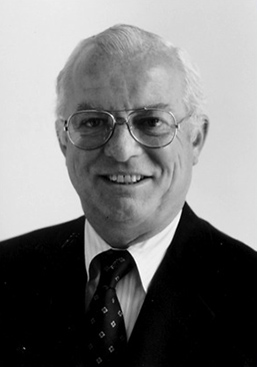
The innovations Joe McIntyre brought to medical advertising and to the success of Sieber & McIntyre were enough for prominence in the historical record, but the impression he made on our business was heightened and enriched by the force of his inimitable personality. Stories of his quick-witted quips, his straight-from-the-shoulder manner in dealing with clients coupled with his dedication to satisfying their needs, his prodigious entertaining, and, in general, his hard-driving salesmanship and management style have made him a legendary figure.
McIntyre began in the pharmaceutical business as a field representative for Upjohn. He left detailing for space sales with American Druggist and then, in 1955, moved to the agency side, becoming an account executive at Jordan Sieber Corbett in Chicago. Within 5 years, he had become a partner in the agency and, by 1963, had assumed leadership of the newly renamed Sieber & McIntyre.
The agency was animated by McIntyre’s energy and his willingness to experiment. He dropped the accepted method of agency compensation, commissions on the purchase of space and materials, in favor of a time-based fee system. This was an eye-opener for clients and competing agencies. To make the system work in the face of criticism from believers in the status quo, he ran S&M under tight control to track accurately time spent on client business. The ever-present time sheets that medical agency people fill out today stem, in large part, from McIntyre’s advocacy of the fee system.
With an appreciation for his years as a salesman of journal space and as a PR promotion for the agency, McIntyre created The Space Salesman of the Year Award in 1968. Winners were chosen by popular ballot and the prize, in addition to the industry’s recognition, was $500. In a time before extensive computer analysis and readership research, when the personal relationship of salespersons with agency media directors was important to selling journal pages, the contest became an anticipated industry event. It was so successful that it was continued on into the late ’80s by the agency and a comparable award is now administered by the Association of Medical Publications.
Sieber & McIntyre did not create client-sponsored publications, but McIntyre made this promotional method a major element in the media mix it recommended to its clients. S&M produced a number of these direct mail vehicles channeling funds that might normally go into medical journals into these company house organs. Needless to say, this redirection of spending into alternative media did not sit well with journal publishers, some of whom questioned the agency’s objectivity in its media buying. McIntyre, who was far from being intimidated by controversy, did not mind the criticism and countered with an agency policy that raised the issue of the objectivity of decisions on journal space based upon the salesman’s expense account. It was a rule at S&M that the agency’s account personnel and media buyers always “picked up the check” for lunch, dinner, or other entertaining. This arrangement was typical of McIntyre’s activist, aggressive style. He was a master at making an emphatic impression which would often startle, but which always contained a valid premise.
For someone who objected to the entertaining of his staff, McIntyre, interestingly, was the champion client entertainer of his day. For a number of years following the NWDA meeting, he would take some 25 couples—clients, publishers, and industry friends—on trips, usually to tropical settings. He was a dedicated golfer and hosted numerous client golf outings. His generosity on these occasions was exceptional, but they were also known for serious competition on the course. McIntyre was tireless.
It was said of him by a competitor, “That guy’s legs never hit the deck!”
McIntyre expected the same commitment from his staff. A former employee recalls, “You were on your toes all the time. You were intense…you drove an agenda all the time, and it was hard, gratifying work, but you better do a damn good job…because Joe believed in the client! And that was the key to it all.”
Another ad executive who worked closely with him provided this assessment of the man and his style: “He brought himself. This is a character we never had before and are never going to have again in the business. He was Joe. He was everything. He was fire…he was quick…very innovative…a tough guy…he fought back. But on top of that he was an entertainer…he was funny. And you never knew which one he was going to be when you ran into him…Clients loved him. Some clients hated him. He was all of that. But he built a very good business and changed the industry.”
McIntyre retired, after selling Sieber & McIntyre to Interpublic, in 1986.